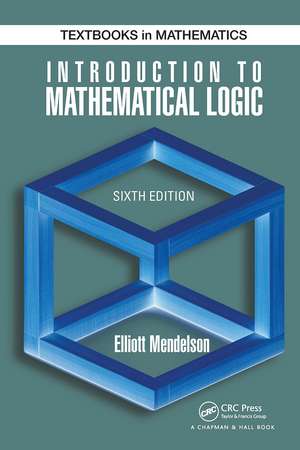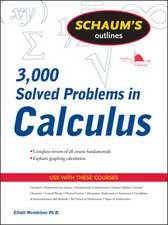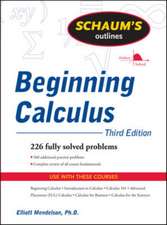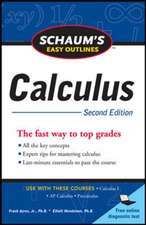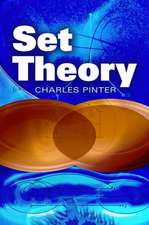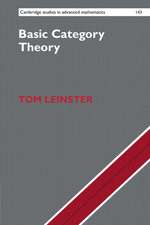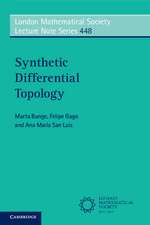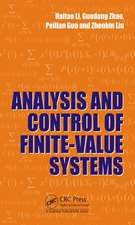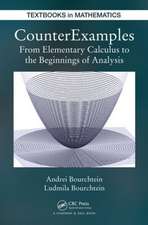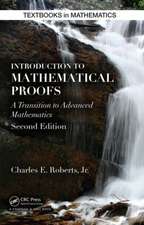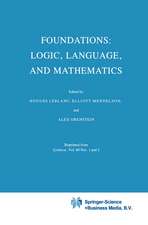Introduction to Mathematical Logic: Discrete Mathematics and Its Applications
Autor Elliott Mendelsonen Limba Engleză Paperback – 14 oct 2024
The sixth edition incorporates recent work on Gödel’s second incompleteness theorem as well as restoring an appendix on consistency proofs for first-order arithmetic. This appendix last appeared in the first edition. It is offered in the new edition for historical considerations. The text also offers historical perspectives and many new exercises of varying difficulty, which motivate and lead students to an in-depth, practical understanding of the material.
| Toate formatele și edițiile | Preț | Express |
|---|---|---|
| Paperback (1) | 334.69 lei 43-57 zile | |
| CRC Press – 14 oct 2024 | 334.69 lei 43-57 zile | |
| Hardback (1) | 833.11 lei 43-57 zile | |
| CRC Press – 8 iun 2015 | 833.11 lei 43-57 zile |
Din seria Discrete Mathematics and Its Applications
- 8%
 Preț: 404.91 lei
Preț: 404.91 lei - 20%
 Preț: 571.04 lei
Preț: 571.04 lei - 8%
 Preț: 409.44 lei
Preț: 409.44 lei - 9%
 Preț: 578.59 lei
Preț: 578.59 lei - 8%
 Preț: 439.83 lei
Preț: 439.83 lei - 9%
 Preț: 1497.66 lei
Preț: 1497.66 lei - 18%
 Preț: 799.85 lei
Preț: 799.85 lei - 18%
 Preț: 1114.97 lei
Preț: 1114.97 lei - 15%
 Preț: 568.28 lei
Preț: 568.28 lei - 20%
 Preț: 819.25 lei
Preț: 819.25 lei - 25%
 Preț: 1307.49 lei
Preț: 1307.49 lei - 25%
 Preț: 881.67 lei
Preț: 881.67 lei - 18%
 Preț: 790.34 lei
Preț: 790.34 lei - 15%
 Preț: 503.98 lei
Preț: 503.98 lei - 15%
 Preț: 687.11 lei
Preț: 687.11 lei - 20%
 Preț: 476.18 lei
Preț: 476.18 lei - 15%
 Preț: 485.18 lei
Preț: 485.18 lei - 25%
 Preț: 682.19 lei
Preț: 682.19 lei - 18%
 Preț: 1149.51 lei
Preț: 1149.51 lei - 18%
 Preț: 733.02 lei
Preț: 733.02 lei - 26%
 Preț: 1183.37 lei
Preț: 1183.37 lei - 24%
 Preț: 1247.82 lei
Preț: 1247.82 lei - 22%
 Preț: 352.95 lei
Preț: 352.95 lei - 15%
 Preț: 688.23 lei
Preț: 688.23 lei - 18%
 Preț: 1343.56 lei
Preț: 1343.56 lei - 31%
 Preț: 435.86 lei
Preț: 435.86 lei - 15%
 Preț: 495.83 lei
Preț: 495.83 lei -
 Preț: 469.34 lei
Preț: 469.34 lei - 20%
 Preț: 1051.90 lei
Preț: 1051.90 lei - 31%
 Preț: 408.36 lei
Preț: 408.36 lei - 25%
 Preț: 557.90 lei
Preț: 557.90 lei - 20%
 Preț: 1658.39 lei
Preț: 1658.39 lei - 15%
 Preț: 686.00 lei
Preț: 686.00 lei - 20%
 Preț: 1403.31 lei
Preț: 1403.31 lei - 18%
 Preț: 1333.77 lei
Preț: 1333.77 lei - 25%
 Preț: 487.41 lei
Preț: 487.41 lei - 25%
 Preț: 1234.04 lei
Preț: 1234.04 lei - 15%
 Preț: 671.43 lei
Preț: 671.43 lei - 18%
 Preț: 787.17 lei
Preț: 787.17 lei - 20%
 Preț: 833.11 lei
Preț: 833.11 lei - 25%
 Preț: 602.92 lei
Preț: 602.92 lei - 18%
 Preț: 848.27 lei
Preț: 848.27 lei - 31%
 Preț: 1040.26 lei
Preț: 1040.26 lei - 31%
 Preț: 1177.39 lei
Preț: 1177.39 lei
Preț: 334.69 lei
Preț vechi: 476.16 lei
-30% Nou
Puncte Express: 502
Preț estimativ în valută:
64.05€ • 66.46$ • 53.53£
64.05€ • 66.46$ • 53.53£
Carte tipărită la comandă
Livrare economică 17-31 martie
Preluare comenzi: 021 569.72.76
Specificații
ISBN-13: 9781032919140
ISBN-10: 1032919140
Pagini: 514
Ilustrații: 28
Dimensiuni: 156 x 234 x 32 mm
Greutate: 0.95 kg
Ediția:6
Editura: CRC Press
Colecția Chapman and Hall/CRC
Seria Discrete Mathematics and Its Applications
Locul publicării:Boca Raton, United States
ISBN-10: 1032919140
Pagini: 514
Ilustrații: 28
Dimensiuni: 156 x 234 x 32 mm
Greutate: 0.95 kg
Ediția:6
Editura: CRC Press
Colecția Chapman and Hall/CRC
Seria Discrete Mathematics and Its Applications
Locul publicării:Boca Raton, United States
Public țintă
PostgraduateCuprins
The Propositional Calculus. First-Order Logic and Model Theory. Formal Number Theory. Axiomatic Set Theory. Computability. Appendices.
Notă biografică
Elliott Mendelson is professor emeritus at Queens College in Flushing, New York, USA. Dr. Mendelson obtained his bachelor's degree at Columbia University and his master's and doctoral degrees at Cornell University, and was elected afterward to the Harvard Society of Fellows. In addition to his other writings, he is the author of another CRC Press book Introducing Game Theory and Its Applications.
Recenzii
Praise for the Fifth Edition
"Since it first appeared in 1964, Mendelson’s book has been recognized as an excellent textbook in the field. It is one of the most frequently mentioned texts in references and recommended reading lists … This book rightfully belongs in the small, elite set of superb books that every computer science graduate, graduate student, scientist, and teacher should be familiar with."
—Computing Reviews, May 2010
"The following are the significant changes in this edition: A new section (3.7) on the order type of a countable nonstandard model of arithmetic; a second appendix, Appendix B, on basic modal logic, in particular on the normal modal logics K, T, S4, and S5 and the relevant Kripke semantics for each; an expanded bibliography and additions to both the exercises and to the Answers to Selected Exercises, including corrections to the previous version of the latter."
—J.M. Plotkin, Zentralblatt MATH 1173
"Since its first edition, this fine book has been a text of choice for a beginner’s course on mathematical logic. … There are many fine books on mathematical logic, but Mendelson’s textbook remains a sure choice for a first course for its clear explanations and organization: definitions, examples and results fit together in a harmonic way, making the book a pleasure to read. The book is especially suitable for self-study, with a wealth of exercises to test the reader’s understanding."
—MAA Reviews, December 2009
"Since it first appeared in 1964, Mendelson’s book has been recognized as an excellent textbook in the field. It is one of the most frequently mentioned texts in references and recommended reading lists … This book rightfully belongs in the small, elite set of superb books that every computer science graduate, graduate student, scientist, and teacher should be familiar with."
—Computing Reviews, May 2010
"The following are the significant changes in this edition: A new section (3.7) on the order type of a countable nonstandard model of arithmetic; a second appendix, Appendix B, on basic modal logic, in particular on the normal modal logics K, T, S4, and S5 and the relevant Kripke semantics for each; an expanded bibliography and additions to both the exercises and to the Answers to Selected Exercises, including corrections to the previous version of the latter."
—J.M. Plotkin, Zentralblatt MATH 1173
"Since its first edition, this fine book has been a text of choice for a beginner’s course on mathematical logic. … There are many fine books on mathematical logic, but Mendelson’s textbook remains a sure choice for a first course for its clear explanations and organization: definitions, examples and results fit together in a harmonic way, making the book a pleasure to read. The book is especially suitable for self-study, with a wealth of exercises to test the reader’s understanding."
—MAA Reviews, December 2009
Descriere
This bestselling, classic textbook continues to provide a complete one-semester introduction to mathematical logic. The sixth edition incorporates recent work on Gödel’s second incompleteness theorem as well as an appendix on consistency proofs for first-order arithmetic. It also offers historical perspectives and many new exercises of varying d
